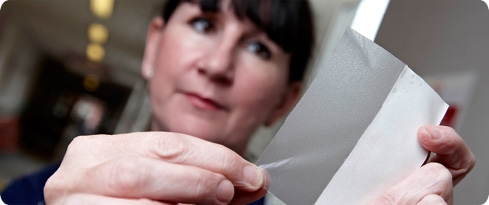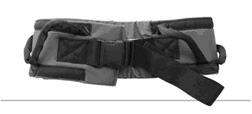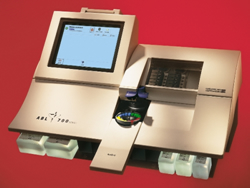Wristband solution gains GS1 certification
SATO UK has received certification from supply chain standards organisation, GS1 UK, for its newly-developed patient wristband identification system. The solution incorporates SATO's CG2 barcode printer, LabelGallery software and the company's existing range of patient identification wristbands. The certification covers its use in UK hospitals and other patient health facilities. SATO managing director, Brian Lang, said: "The decision to certify the new patient wristband system reflects our depth of experience in providing identification solutions to the healthcare industry and follows our recent success in being recognised as a GS1 Solutions Partner. SATO will continue to develop effective and innovative identification solutions for the healthcare industry, both today and in the future."
Innovative device helps detect cancer
A SPONGE which could help detect throat cancer is being tested in a large multi-centre trial funded by Cancer Research UK. It is hoped the Cytosponge will improve detection of Barrett's oesophagus, a condition that increases the risk of developing cancer of the oesophagus, one of the most deadly cancers. The test involves patients swallowing a small capsule with a string attached, which dissolves in the stomach and expands to form a 3cm sponge. The sponge is gently drawn back out using the string, removing a small sample of the cells lining the oesophagus as it passes. These can then be tested in the lab for early signs of cancer. Each test should cost just £25, compared with £400 for a traditional endoscopy, and the procedure is far less invasive. Chief investigator, Dr Rebecca Fitzgerald, who led the Cambridge-based team that developed the test, said: "If this trial is successful it will provide a cheap, safe and highly-effective method of identifying people with Barrett's oesophagus so they can take steps to reduce their risk of developing cancer. This would also open the doors for a national screening programme, much like those offered for breast, cervical and bowel cancers, to help prevent oesophageal cancer among the one to two people in every 100 with Barrett's oesophagus who go on to develop the disease." Earlier pilot studies, funded by the Medical Research Council, found that patients significantly preferred cytosponge compared to endoscopy. This latest study will look more closely at the accuracy of the test and identify new biomarkers for diagnosing the different grades of Barrett's oesophagus more reliably.
Boost for Scottish radiotherapy services
RADIOTHERAPY departments at five hospitals are to benefit from new cancer treatment systems after the Scottish Government awarded a £22m contract to Varian Medical Systems. The deal will provide new equipment that can treat tumours in a faster, more precise manner to: Aberdeen Royal Infirmary; Ninewells Hospital in Dundee; Western General Hospital in Edinburgh; the Beatson West of Scotland Cancer Centre in Glasgow; and Raigmore Hospital in Inverness. Health Secretary, Nicola Sturgeon, said: "The award of this contract will ensure cancer centres in Scotland have the best possible radiotherapy equipment, providing patients with quality treatment. Rather than purchase the new equipment on a hospital by hospital basis, this contract has been negotiated on a national basis, resulting in cash savings which we can re-invest in Scotland's health service."
Study explores use of new tape in dialysis

PATIENTS on peritoneal dialysis (PD) have been taking part in a pilot study exploring the benefits of using a steroid-impregnated tape over standard treatment of silver nitrate. The trial of the tape used to treat overgranulation of PD exit site was devised by ward sister, Siobhan McEntee, who worked closely with renal consultant, Lukas Foggensteiner, both from University Hospitals Birmingham NHS Foundation Trust. McEntee said: "The standard treatment of silver nitrate has to be applied by a qualified nurse, which means the patient has to come to the hospital two to three times a week for up to six weeks. The steroid-impregnated tape can be applied by the patient daily in their home, which has major benefits, saving both patient and nursing time, thus improving patient satisfaction." The intention now is to apply for funding to enable a larger clinical trial to be undertaken to confirm the initial findings from Birmingham. McEntee said: "The results here were very positive and we hope a larger trial will show the advantages of using the tape over standard treatment and the benefits for patients and nursing teams." She added: "This is a good example of the importance of nurses getting involved in research. They have a unique insight into clinical problems that may be overlooked by doctors and are in a position to develop and evaluate new treatments for the benefit of patients. I hope this example will encourage other nurses to look at their area of clinical practice and think imaginatively about how they could contribute to improving patient care."
Bucks hospital upgrades MRI
STOKE Mandeville Hospital with a Siemens Healthcare total imaging matrix (TIM) upgrade. The upgrades cost less and cause less disruption than a new installation, but still improve image quality and offer faster scan times. Debbie King, modality lead radiographer for MRI at the hospital in Aylesbury, Buckinghamshire, said: "Our scanner was approaching eight years old, so we had to make a decision to replace or lengthen its life. We opted for a TIM upgrade and have been really pleased with the benefits; gaining faster scan times and better signal-to-noise ratio for improved image quality. As a result we have been able to introduce a new cardiac imaging service at the hospital to avoid the need for patients to be referred elsewhere."
Medical Device Alerts issued

THE Medicines and Healthcare products Regulatory Agency (MHRA) has issued two Medical Device Alerts covering blood gas analysers from Radiometer and Durewall handling belts supplied by Prism Medical. The first warning concerns Radiometer models ABL505/555, EML105, ABL600, ABL700 Series and ABL800. The second notice covers handling belts with order codes DUR03, DURMED and DURLGE supplied before January 2011.

In the first instance the warning comes amid concerns of the potential for biased blood calcium results which may affect diagnosis and treatment of hypocalcaemia; while the second was issued because the instructions do not provide clear guidance on how to rethread the buckle nor the checks that should be carried out before use.
ALSO IN THE NEWS:
Siemens Healthcare has launched a dual digital fluoroscopy and radiography system designed to offer greater patient comfort. The Luminos Agile is designed for fluoroscopy use, but can be expanded for radiography when integrated with the Ysio ceiling-suspended X-ray tube, wireless detector and wall stand.
Royal Philips Electronics has announced it has struck an agreement with Masimo to integrate rainbow SET technology into Philips patient monitoring solutions. The technology analyses multiple wavelengths of light to accurately measure total haemoglobin, oxygen content, carboxyhaemoglobin, methemoglobin and PVI non-invasively and continuously.
